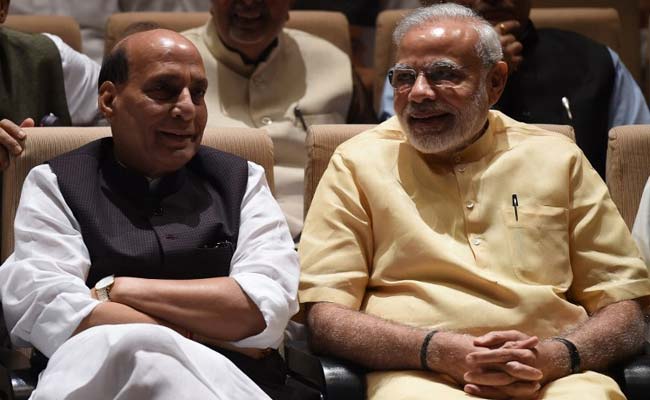Apart from the theoretical aspect, there is a very practical dimension too. In the last week, various masterminds of terrorism sheltered in Pakistan have been fulminating against Rajnath Singh setting foot on that country's soil. In fact, the man who planned and executed the ghastly outrage of 26/11 and has been declared a dangerous terrorist by world bodies has called for a "nationwide agitation" to protest the Indian Home Minister's visit. Addressing a rally close to the Wagah border last week, Jaish-e-Mohammed chief Syed Salahuddin told his hysterical audience that "killers of Kashmiris and Pakistanis" were not welcome in that country. The underlying message was that the Indian Home Minister would come to Pakistan at his own risk. They even demanded that Pakistan recall its envoy from India and break off diplomatic and trade ties to protest Indian "atrocities" in the Kashmir Valley.
Although we need not take the bluster of such loathsome fire-breathing ogres seriously, for there is no doubt that the government of Pakistan will ensure the safety of its Indian guest, the atmosphere has been seriously vitiated by such verbal vitriol. Matters are made worse by the fact that these mass killers and their masterminds enjoy the protection of the Pakistan government. It is very apparent that the rulers in Islamabad allow these criminals to prosper and plot despite the not-so-veiled contempt in which they hold the Pakistan government's leaders. For example, a recent statement by the terrorists ranting against Rajnath Singh's visit began with a jibe describing the Pakistan Prime Minister as the "ailing Nawaz Sharif". In other words, despite the moral and material support extended to the terrorists, they have little regard for the country's elected government or its democratic process.

Home Minister Rajnath Singh with PM Modi during a BJP parliamentary committee meeting on Tuesday
Ironically, the SAARC Home Ministers' Conclave is slated to discuss counter-terrorism and measures for its effective combat. On the face of it, this sounds surreal. But experience tells us that breaking off the dialogue - whether bilateral or multilateral - serves no long-term purpose. So at the risk of India's complaints falling on deaf ears, our position has to be reiterated again and again because the alternative to dialogue is actually quite frightening, since war is not an option between two nuclear powers.
Rajnath Singh is expected to table India's case and seek the support of all SAARC nations in jointly combating terrorism in all its manifestations, especially its jehadi variant. In light of the recent terrorist attack on a Dhaka café; and targeted killing of secular writers and even traditional folk singers in that country, the situation in Bangladesh is also likely to come up at the meeting. Pakistan's ISI is alleged to have sponsored certain home-grown jehadi outfits in Bangladesh, with the aim of destabilising the government of Prime Minister Sheikh Hasina. The island nation of Maldives too is facing increasing threats from jehadi elements. At this juncture, India's leadership of forces ranged against terror acquires considerable importance.

In December, PM Modi made a surprise stopover in Pakistan on his way home from Afghanistan
Rajnath Singh handles India's most complex internal problem, namely the law and order situation in Jammu and Kashmir, caused largely by Pakistani instigation. Therefore to stand on Pakistani soil and call a spade a spade requires great diplomatic finesse. But it is to the Modi government's credit that it has discarded an inflexible policy towards Pakistan. We all know that Pakistan will not let go any opportunity to bleed India within and embarrass it without. But we need to demonstrate to the world that despite continuous provocation, India will work towards broad-basing the regional and global anti-terror coalition. To that end, it is important to keep a window, if not a door, open for dialogue with Pakistan. The entire sub-continent will suffer terribly if jehadis gain an even greater control over the levers of government in Pakistan than they already have. It is also essential that other SAARC countries fight jehadi terrorism within their borders and cooperate mutually to progressively de-fang terror groups across the entire SAARC region. Pakistan's duplicitous policy towards terrorist organizations also needs to be exposed before countries such as Afghanistan that are suffering as a result of Islamabad's tactic of running with the hare and hunting with the hound.
We cannot expect that Rajnath Singh's visit alone will have the effect of shaming Pakistan into good behavior. But by exposing its nefarious activities at a multilateral regional forum, the Indian Home Minister will achieve his immediate objective. From all accounts then, Prime Minister Modi and Home Minister Rajnath Singh took the right decision to participate in the SAARC meeting on Pakistani soil. Now it is to be seen if the lion can be bearded in its own den.
(Dr. Chandan Mitra is a journalist, currently Editor of The Pioneer Group of Publications. He is also BJP MP of the Rajya Sabha.)
Disclaimer: The opinions expressed within this article are the personal opinions of the author. The facts and opinions appearing in the article do not reflect the views of NDTV and NDTV does not assume any responsibility or liability for the same.


